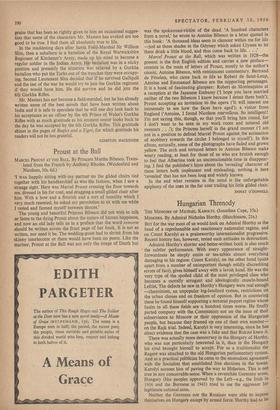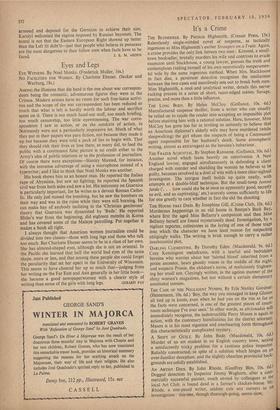Hungarian Threnody
THE MEMOIRS OF MICHAEL KAROLYI. (Jonathan Cape, 35s.) MEMOIRS. By Admiral Nicholas Horthy. (Hutchinson, 21s.) BUT for the war most of us would look on Admiral Horthy as the head of a reprehensible and reactionary nationalist regime, and on Count Karolyi as a praiseworthy internationalist progressive. Recent history has, however, tested such attitudes to destruction. Admiral Horthy's shorter and better-written book is also much the subtler performance. With every appearance of straight- forwardness he simply omits or tea-tables almost everything damaging to his regime. Count Karolyi, on the other hand (quite apart from a number of unimportant though mildly discrediting errors of fact), gives himself away with a lavish hand. He was the very type of the spoiled child of the most privileged class who becomes a morally arrogant and ideologically muscle-bound Leftist. The defects he saw in Horthy's Hungary were real enough —chauvinism, an unpopular big-landlord system, restrictions on the urban classes and on freedom of opinion. But in countering these he found himself supporting a terrorist puppet regime whose faults in all these fields are a hundred times worse. He finally parted company with the Communists not on the issue of their subservience to Moscow or their oppression of the Hungarian people, but because they framed up one of their own number— on the Rajk trial. Indeed, Karolyi is very interesting, since he has direct evidence that the case was a fake and that Rakosi knew it.
There was actually more democracy in the Hungary of Horthy, who was not particularly interested in it, than in the Hungary his rival brought himself to accept. For as a traditionalist the Regent was attached to the old Hungarian parliamentary system. And as a practical politician he came to the anomalous agreement with the Socialists that established free elections in the towns. Karolyi accuses him of paving the way to Hitlerism. This is not true in any conceivable sense. When a revanchist Germany arose, Hungary (like peoples approved by the Left—e.g., the Irish in 1916 and the Burmese in 1941) tried to use the aggressor for legitimate national aims.
Neither the Germans nor the Russians were able to impose themselves on Hungary except by armed force. Horthy had to be arrested and deposed for the Germans to achieve their aim. Karolyi welcomed the regime imposed by Russian bayonets. The moral is not that the Eastern European Right showed up better than the Left (it didn't)—just that people who believe in panaceas are the most dangerous to their fellow men when facts have to be



































 Previous page
Previous page